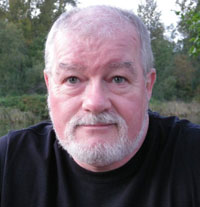
| |
| |
| |
| |
| |
| |
| |
| |
| |
|
  Matthew Hughes |
by Matthew Hughes
A Novel of the Archonate An excellent place to start would be his latest paperback release, Template. Set in the Archonate universe, Template is nevertheless a self-contained mystery that has no overlap in characters and requires no previous familiarity with the series. The story concerns the adventures of one Conn Labro, a professional duelist who has nevertheless lived a very sheltered life within the confines of one of the great sporting houses of his home world, Thrais. When a favorite client is found murdered and Labro's home destroyed, he sets out to solve the crimes and the deepening mystery of his unexpected inheritance. |
Once off Thrais, however, he discovers that he is hopelessly out of his depth when he tries to interpret the actions of others through the narrow lens of his own culture. Constantly bumping into the differing mores of other worlds, he is forced to rely on the services of his Good Samaritan guide, Jenore Mordene. Jenore, and the others they encounter enroute to old Earth, slowly break through Labro's preconceptions and allow him to see that events and relationships are open to more than one interpretation.
One particularly nice touch here is how Hughes characterizes Labro's growth through changes in dialog. Labro's initially rigid mindset manifests in an almost autistic speech pattern, but as Labro's worldview expands, there is a corresponding increase in the fluidity of his conversation. (Although this makes for somewhat less of the sardonic dialog that is the trademark of Hughes' Archonate series, it is oddly satisfying to realize that not everyone in his universe talks that way; just the erudite characters who happen to be the protagonists in those other books.)
But Labro not only broadens his own horizons; Jenore similarly realizes that she can't go home again, as her travels across "the spray" Ñ the myriad worlds of human occupied space Ñ have led her to grow beyond the confines of her own cultural upbringing. Hughes also weaves in some subtle discussion on the nature/nurture debate, an implicit rejection of cultural relativism through Jenore's character, and a rather droll paradigm for the study of culture templates, all of which makes for a more thoughtful book than might at first might appear to be the case. In spite of Hughes' often leisurely pacing, this is still primarily a page-turning mystery, with all the vile villains, distressed damsels, dark secrets, and duels to the death anyone could wish for, so it would be easy to miss just how deeply philosophical Hughes novels truly are.
I should also note that Template is only one of two SF novels in which I have ever enjoyed the depiction of an SF sport. (The other was, not surprisingly for Hughes fans, the rousing game of Hussade in Jack Vance's Trullion: Alastor 2262.) Hughes description of birl, a sort of cross between log rolling and lacrosse, makes me want to set up a league and give it a try. (And talk about Canadian content! If only he'd been able to work in ice skates!)
So, as with all of Hughes' work, Template is highly recommended; required reading for anthropology undergraduates.
© 2008 Robert Runté Reprinted with permission from NeoOpsis Magazine, #15 (Fall, 2008) pp. 69-70. The original review referred to the 2008 hardcover release from PS Publishing.
Last Updated, July 2010.